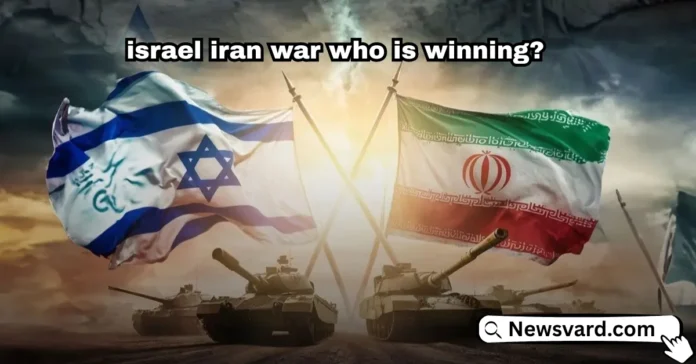Introduction
The ongoing war between Israel and Iran has ended up as one of the most volatile and complicated confrontations in the Middle East. Fueled through deep-rooted political, spiritual, and strategic rivalries, the tension has spilled over into navy moves, cyberattacks, and proxy wars throughout the place. As each nations assert its influence and guards their interests, the global network watches intently, elevating the question: who is prevailing in this battle? The solution relies upon multiple factors—military might, regional alliances, economic resilience, and public perception—all of which paint a nuanced and evolving picture of the struggle. Israel-Iran war: Who is winning
Military Engagements and Tactical Victories
In terms of army power, Israel has maintained a clear advantage due to its advanced weaponry, advanced air defense structures, just as the Iron Dome, and relatively effective intelligence offerings. The Israeli Defense Forces (IDF) have correctly completed centered airstrikes on Iranian-related positions in Syria and Lebanon, weakening Iran’s logistical and operational abilities. On the other hand, Iran has leaned heavily on its community of proxy corporations, which includes Hezbollah and other militant factions, to launch coordinated attacks and maintain pressure on more than one front. While Iran lacks Israel’s technological facet, its approach of oblique confrontation has allowed it to live in the combat without undertaking complete-scale warfare. This tug-of-war continues to conform, with Israel gaining more tactical victories, but Iran proving difficult to completely suppress. Israel-Iran war: Who is winning?
Cyber Warfare and Intelligence
Cyber conflict has become a crucial front within the Israel-Iran struggle. Israel has long been taken into consideration a global leader in cyber capabilities, with sophisticated operations attributed to its intelligence agency, Mossad, and cyber units like Unit 8200. One of the maximum notable examples is the Stuxnet worm, which reportedly disrupted Iran’s nuclear centrifuges and delayed its nuclear ambitions. In recent years, Israel has continued to behavior cyberattacks concentrated on Iran’s infrastructure, nuclear websites, and government databases. Iran, whilst less advanced, has drastically improved its cyber competencies. Iranian hackers have launched retaliatory assaults on Israeli hospitals, transportation structures, and financial establishments, showing a growing flair for disruption. Israel-Iran war: Who is winning?
Regional Influence and Diplomatic Pressure
Iran has invested in building a community of nearby allies and proxy businesses to increase its impact across the Middle East. Through Hezbollah in Lebanon, the Assad regime in Syria, militias in Iraq, and the Houthis in Yemen, Iran exerts pressure on Israel and U.S. Allies, developing a complex internet of warfare of words. However, Israel has made top-notch diplomatic gains in recent years, mainly through normalization agreements with several Arab countries under the Abraham Accords. These alliances have improved Israel’s regional legitimacy and strategic intensity. Moreover, Israel continues to enjoy sturdy aid from Western powers, specifically the USA, which provides it with superior weaponry, intelligence, and political backing at worldwide forums. Israel-Iran war: Who is winning?
Domestic Stability and Economic Impact
In terms of home balance, Israel presently enjoys an improved and resilient inner environment as compared to Iran. Despite the strain of ongoing army operations and the psychological toll on its populace, Israel is blessed with an assorted economy, strong global partnerships, and a noticeably unified public front at some stage in times of conflict. Iran, however, is grappling with long-standing economic demanding situations worsened by way of international sanctions, high inflation, and great public dissatisfaction. Protests over monetary trouble and political repression have periodically erupted across Iranian towns, undermining the regime’s domestic credibility. While both nations bear the charges of struggle, Israel appears better geared up to absorb and recover from the financial and social effects of the battle. Israel-Iran war: Who is winning?
Global Perception and Media Influence
The global perception of the Israel-Iran conflict is especially polarized and stimulated by way of nearby alliances, historical narratives, and media framing. In Western global places, specifically the United States and components of Europe, Israel often enjoys sturdy political and media support, rooted in long-standing alliances and shared democratic values. However, increasing scrutiny over civilian casualties and humanitarian crises—especially in Gaza and Lebanon—has brought about growing public complaint and protests towards Israeli movements. Iran, even as widely condemned for its authoritarian regime and sponsorship of terrorism, manages to garner sympathy in components of the Muslim global and among nations in the Global South through portraying itself as a defender of oppressed Muslims, specifically Palestinians. Social media also plays an essential function, amplifying each pro-Israel and anti-Iran narratives relying on the platform and audience, making the record battle as massive as the army one. Israel-Iran war: Who is winning?
What could appear in the future?
In the end, the Israel-Iran struggle could escalate into a broader regional war if proxy clashes spiral out of control or if either side conducts a high-profile strike, which includes targeting nuclear centers or prominent towns. Alternatively, sustained global stress and backchannel international relations might push both nations in the direction of de-escalation or even oblique negotiations. The involvement of world powers like the U.S., Russia, and China may want to heavily have an impact on the route of the war, either by way of intensifying it through alliances or supporting a comprise it through diplomacy. Cyber war, incorrect information campaigns, and economic war will possibly continue to play key roles, making the following phase of the war a good deal of a virtual and ideological struggle as well as a bodily one. Israel-Iran war: Who is winning?
Conclusion
The Israel-Iran struggle remains a complicated and multifaceted war without a clear winner. While Israel keeps a decisive part in the army, intelligence, and international alliances, Iran keeps to wield enormous impact through its regional proxies and asymmetric processes. Each side is pursuing extraordinary objectives—Israel seeks safety and deterrence, while Iran seeks to increase its nearby strength and mission to Israeli dominance. In the cease, the final results won’t be decided by battlefield victories on my own, but by using long-term strategic profits, political persistence, and the shifting alliances in an increasingly more risky Middle East. Israel-Iran war: Who is winning?
FAQs
Q1: Is Israel presently triumphing in the battle against Iran?
A: Militarily and technologically, Israel has the upper hand. It possesses advanced protection structures, superior intelligence operations, and robust international alliances. However, Iran’s use of proxy forces and local influence complicates a clear victory. Israel-Iran war: Who is winning?
Q2: How does Iran fight back against Israel?
A: Iran largely avoids direct war of words. Instead, it uses proxies such as Hezbollah, Hamas, and militias in Iraq and Syria to strain Israel from more than one front. It additionally engages in cyber struggle and psychological strategies. Israel-Iran war: Who is winning?
Q3: Has there been any direct battle between Israel and Iran?
A: While the 2 international locations have exchanged missile moves and cyberattacks, they have not declared full-scale conflict. Much of the conflict is fought indirectly through proxies, airstrikes in third-birthday celebration international locations, and covert operations. Israel-Iran war: Who is winning?
Q4: What function do different countries play in this warfare?
A: The United States supports Israel with navy resources and intelligence. Iran receives indirect guidance from Russia and China and affects Iraq, Syria, and Lebanon. Gulf Arab states are primarily aligned with Israel towards Iranian expansion. Israel-Iran war: Who is winning?





























